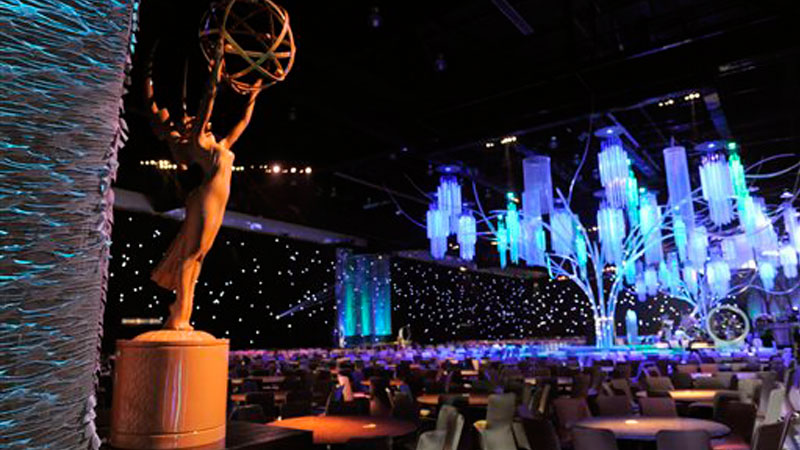
An Emmy statue is placed near the entrance to the Los Angeles Convention Center during the Governors Ball Preview at the 65th Emmy Awards Press Preview Day, on Wednesday, Sept. 18, 2013, in Los Angeles. Photo by Chris Pizzello/Invision/AP
WASHINGTON – Five TV series with 32 primetime Emmy nominations between them have two things in common: they’re set in Washington, and they’re not made in Washington.
For all the real-life political drama in the nation’s capital, hit shows like “Homeland” and “House of Cards” are filmed somewhere else, much to the frustration of Washingtonians who would like a bigger slice of the Hollywood action.
“It’s a real challenge,” admits Crystal Palmer, head of the city’s Office of Motion Picture and Television Development.
“People tend to think (a Washington-themed series) originated here, when in actuality it did not.”
“House of Cards,” starring Kevin Spacey as a congressman with a serious Machiavellian streak, is up for nine Emmys – but it’s filmed up the road in Baltimore, Maryland.
“Homeland” casts Claire Danes as a bipolar CIA agent tracking down terrorists. It received 11 nods – but it’s shot 400 miles (600 kilometers) away in Charlotte, North Carolina.
The comedy “Veep” and the mini-series “Political Animals,” with five nominations apiece, were made in Baltimore and Philadelphia, respectively.
And political thriller “Scandal” is produced on the other side of the country in Los Angeles. It has two nominations, including a best drama actress nod for the aptly-named Kerry Washington.
It’s a state of affairs that the capital has endured since the 1930s, when Jimmy Stewart got off the train at Union Station in “Mr Smith Goes to Washington” and came face-to-face with the dark side of US politics.
That film’s director Frank Capra shot a few scene-setting landmark shots in Washington, and then recreated Capitol interiors back in Hollywood – a formula used by countless movie-makers and TV shows ever since.
One reason is that Washington is pretty much a company town – the company being the federal government – and that throws up a lot of logistical hurdles, from traffic congestion to security clearances to filming in public venues.
Getting prime exterior footage of the Capitol requires a permit from its security detail, for instance. Doing the same at the White House means calling up the Secret Service.
But Palmer says a bigger factor is money – and on that score, Washington is hard-pressed to compete when it comes to wooing Hollywood with generous tax breaks.
“The incentive programs really cut into our business,” she told AFP in an interview.
In 2011, 37 states had a film incentive program, offering a total of $1.3 billion, according to the Tax Foundation, a Washington think tank that questions the effectiveness of such policies.
Maryland used its $7.5 million tax-credit envelope to lure “House of Cards” after a spirited competition with Washington to woo the Netflix series.
In return, during the making of season one, the show’s producers hired 2,200 Marylanders – from day extras to experienced technical crew – and bought goods and services from 1,800 businesses.
“We’ve doubled for DC, I think you can say, for decades,” said Jack Gerbes, director of the Maryland Film Office. “It’s a strong alternative to actually shooting in the nation’s capital.”
Baltimore played its gritty post-industrial self in the acclaimed TV drama “The Wire.” Its varied neighborhoods give location scouts plenty of scope for recreating Washington sites.
In North Carolina, the Charlotte Regional Film Commission estimates that “Homeland” generated $45 million of local spending during its first season in production. Season three premieres on September 29.
That compares to the $60 million spent by the makers of “The Hunger Games,” which used Charlotte as their production base.
Much of the action in “Homeland” unfolds in suburban Washington, and “suburban is suburban anywhere,” said Mark Washburn, the TV writer for the Charlotte Observer newspaper who grew up in Washington’s outskirts.
North Carolina has some of the most competitive tax breaks in the United States for the film and TV industry, offering a 25 percent tax rebate on salaries and money spent on taxable items, according to Washburn.
But with its thicket of modern skyscrapers, downtown Charlotte – the financial hub of the American South – falters as a stand-in for the grandeur of low-rise Washington.
When that happens, Palmer said, what viewers get to see is “a facsimile at best.”
First posted September 20, 2013 | 1:52 pm

